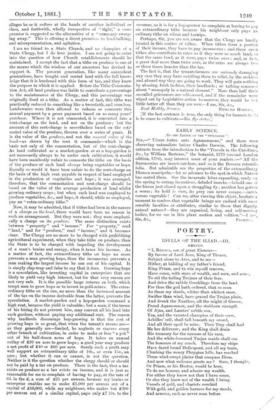POETRY.
IDYLLS OF THE ILIAD.—III.
RHESUS.
"I, RHESUS, son of great Eioneus- By favour of Lord Ares, King of Thrace, Subject alone to Ares, and to me- _ Hither, at bidding of my father's friend, King Priam, and to win myself renown, Have come, with store of wealth, and men, and arms, To rid the toiling Trojans of their fear, And drive the rabble Greeklings from the land.
For thus the god hath ordered, that so soon As these my steeds, whiter than whitest snow, Swifter than wind, have grazed the Trojan plain, And drunk the Xanthus, all the might of Greece, Proud Agamemnon, and the stubborn strength Of Ajax, and Laertes' subtle son, Yea, and the vaunted champion of their crew, Achilles' self, shall fall beneath my sword, And all their spoil be mine. Then Troy shall hail Me her deliverer ; and the King shall drain His treasury for the ransom of his race, And the white-bosomed Trojan maids shall sue The honours of my couch. Therefore my ships Have dared broad Hellespont, and all my train, Climbing the weary Phrygian hills, has reached These wind-swept plains that compass Ilium.
And now what welcome greets me ? Sure, I thought, Or Priam, or his Hector, would be here, To do me honour, and admire my wealth.
For either they know not that I have come,
Or else they knew not of the wealth I bring. Vessels of gold, and chariots overlaid With gold, and golden harness for my steeds, And armour, such as never man before
Has worn, beseeming the Immortal Gods, A marvel to behold. Now, by the might Of Ares, and to show what man I am, Here will I camp this night, nearest the Greeks, Beside these men of Caria, Mysia, Canconians, Leleges,—I know not what ; Here will I camp, nor shall my horses taste The grass of Troy, nor drink their Trojan streams, Till, in to-morrow's battle, I shall slay Some rich-armed Greek, it may be Diomede, Or whom the god shall cast into my hands.
Then will I lade my chariot with the spoil, And ride through shouting Trojan throngs to Troy."
So Rhesus spake, and bade his Thracian serfs There, on the sands, outside the Trojan lines, Set up the broidered splendour of his tent, Wrought in Edonian looms, and spread the meal.
Then, when the meal was done, they brimmed the wine
Red, fragrant, luscious, such as Thracians love,—
And Rhesus drank his fill till eventide.
Then in three lines they drew the chariots up, Chariot by chariot, and by each its steeds : But Rhesus' steeds, whiter than whitest snow, Swifter than wind, a marvel to behold, They tethered to his golden chariot-rail, And set their harness on, and silvern troughs Before them, filled with barley ; and bestowed The golden armour in the gilded car, That with the dawn their King might try the war, And taste his promised triumphs.
As an ox Stall-fed, beside his manger, lays him down, Sleek with content, nor dreams to-morrow's sun Will bring the slayer, and the slayer's knife,— So, filled with wine and food, upon the sands, Beside his steeds, King Rhesus laid him down ; And darkness fell, and all the plain was still.
Then 'to the tent, beneath the darkness, stole, Guided by coward Dolon from the ships, Tydeides, and Laertes' subtle Son; And the next morning saw a headless corse, Which had been Rhesus, and the horses gone : Nor ever did they taste of Trojan grass, Nor drank of Xanthus, but in alien stalls Fed careless, and forgat their Thracian lord.































 Previous page
Previous page